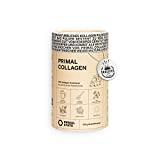
At first it is important to know what collagen is - and that there are different variants of it.Julia Sausmikt says: "Collagen is a structural protein, i.e. a protein that occurs in different variants in the body, depending on whether it is collagen in the skin, cartilage or in other tissues."Biochemically, 28 different types of collagen are differentiated, according to the expert."The human skin mainly consists of type I collagen, cartilage of type II contains collagen.The respective tissue cells produce the right collagen themselves."
The nutritionist explains: "Collagen molecules mainly consist of the amino acids Prolin and Glycin.These two amino acids are also not essential, so they do not have to be absorbed through food, but can be made by the body itself."In nutritional supplements such as collagen powder, collagen is usually used as a water-soluble collagen hydrolyzate, which is obtained from slaughterhouse waste such as the skin or the bones of pigs and cattle.During hydrolysis, the collagens are already broken down into smaller fragments, so-called collagen peptides, the expert says.But there are also collagen powder with additives from poultry and fish remains on the market.
Affiliate LinkAmazon | Kollagen-PulverJetzt shoppen29,99 €How does collagen powder work in the body?
If the body produces collagen itself, what do products like collagen powder bring?Sausmikt explains: "Due to the age, there is a reduction in collagen structures of the deeper layers of the skin and thereby a loss of stability.The collagen cartilage tissue in the joints is also subject to natural wear."Products such as collagen powder, which can be mixed in food such as yogurt or as a smoothie or shake, promise that the collagen contained in" defective "places in the body (such as skin or articular cartilage) is used as a component for repair.But it's not that simple as the expert explains.
"In the digestive tract, the collagen is just as well as other proteins that we consume in the form of food.The body absorbs these amino acids, di- and tripeptides- whether it produces complex collagenes and places in the right place is on a completely different sheet."There are studies that show an improvement in the depth of wrinkles and skin elasticity by taking collagen (hydrolysate).It is therefore not excluded that nutritional supplements such as collagen powder have an effect.According to the expert, it is questionable that these changes are recognizable with the naked eye.
Affiliate LinkAmazon | Hefe-, gluten- und laktosefreies Kollagen-PulverJetzt shoppen29,99 €
Julia Sausmikat continues: "Dietary supplements with collagen hydrolysate are often advertised to be able to alleviate damage to joint cartilage and arthrosis -related symptoms.However, such disease -related advertising statements are prohibited for nutritional supplements.High -quality scientific studies that prove the support of skin or cartilage by taking collagen in healthy people are missing."After examination by the European Food Safety Authority (EFSA), the EU has rejected health -related information about collagen in food that relates to an improved skin structure and joint health due to a lack of scientific evidence, explains the consumer protection.
Collagen powder: What should you consider when buying?
The products are not harmful.Julia Sausmikt explains what you should pay attention to when buying collagen powder: "If you don't want to take products from the pig, you should pay particular attention to the product labeling-the majority of the collagen are obtained from pig gait.And: there are no vegan collagen.Products called vegan usually contain a mix of amino acids glycine, proline, hydroxyproline and L-lysine and no collagen."
Can the intake of collagen powder be dangerous?
"Dietary supplements with collagen are legal food and must generally be safe.The manufacturer has to make a dosing specification that should not be exceeded, "explains the nutritionist.However, there are possible side effects: "Products with collagen can trigger allergic reactions and intolerances, which applies particularly to people with a fish allergy when the collagen was made from fish skins."Such allergens must be marked.
Furthermore, the frequently added substances such as Nicotinamide or.Nicotic acid (vitamin B3) are problematic, which can trigger intolerance reactions such as facial reductions and hot flashes if the intake is too high."Products should not contain more than four milligrams of nicotinic acid, 160 milligrams of Nicotinamide or 4.4 milligrams inosithexanicotinate (inositolniacinat) per daily dose."In addition, dietary supplements with collagen sometimes contain recording amplifiers such as Piperin, an extract made of black pepper, says Julia Sausmikt."According to the Federal Institute for Risk Assessment (BfR), adults should not absorb more than two milligrams of isolated piperine per day via dietary supplements.The BFR advises pregnant women from the use of such funds."
Affiliate LinkAmazon | "Kollagen – Die 28-Tage-Diät"Jetzt shoppen22,99 €If you want to consume collagen powder, you can do this without any problems taking into account the information.However, the expert thinks: "An additional supply of collagen or collagen hydrolysate is not necessary at all.Those who eat a varied diet take up all the important protein building blocks, from the amino acids of which the body then produces the collagen."Various authors have explicitly listed in books, such as the title" Collagen-the 28-Day Diet ", which food can be used.Julia Sausmikat's personal conclusion: "Dietary supplements with collagen powder cannot stop skin aging.Sun protection, waiver of nicotine and a healthy lifestyle, on the other hand, are already."
Used source: "JDD"
You might also be interested in:
This article contains so-called affiliate links.There is more information here.







